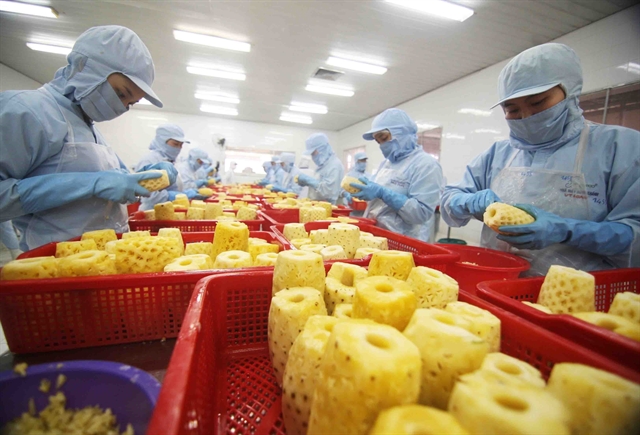 Society
Society

 |
| Workers process pineapples for export in the southern province of An Giang. — VNA/VNS Photo Vũ Sinh |
HÀ NỘI — The State should have specific policies to encourage learners and attract students to agriculture, forestry and fishery majors, said professor Trần Đức Viên.
Talking to the Việt Nam Education e-journal, Viên, who is chairman of the science and training council under the Việt Nam National University of Agriculture (VNUA), said that in recent years, the number of students enrolled in the agriculture, forestry and fishery majors has decreased.
Statistics of the Ministry of Education and Training in 2020 showed that the rate of new students entering universities and colleges in the whole country is 86.4 per cent, whereas the enrollment rate in the agriculture, forestry and fishery majors is only 43.9 per cent, just half of the national rate.
Last year, the rate was 93.2 per cent and 62.4 per cent, respectively.
It is worth mentioning that while the number of students enrolling in the majors decreased, the market is in dire need of high-quality human resources for this sector.
Việt Nam’s human resource development plan for the 2011-20 period issued by the Ministry of Agriculture and Rural Development (MARD) identified that the country needed 18,480 workers with university qualifications for this sector per year in the 2011-15 period, and 18,000 per year in 2016-20.
The strategy of sustainable agricultural and rural development issued by the Prime Minister also defined that the rate of trained agricultural workers reaching over 70 per cent was one of the goals by 2030.
Agriculture, forestry and fishery is identified as a key economic sector in Việt Nam.
The field's export so far this year has officially set a new record, with a turnover of US$49.04 billion, surpassing $48.6 billion last year.
It is forecast that by the end of this year, agricultural, forestry and fishery exports will reach over $53 billion.
The sector has applied science and technology in almost every stage of the production process. Therefore, it needs a lot of human resources and the demand for recruitment is very high.
Professor Viên said that enterprises cooperated with universities and colleges from the stage of setting up training programmes, so that learners will have the best response to the production environment after graduation and minimise retraining costs.
However, many enterprises are not ready to accompany training institutions in paying tuition and living expenses for learners, he said.
Currently, universities are improving training quality, helping students not only study, research, and improve themselves, but also flexibly and creatively apply their knowledge to solve practical problems in society and in their future careers.
As for the VNUA, it added modules associated with high-tech agriculture, set up new industries based on requirements of the fourth industrial revolution, such as hi-tech agriculture industries, data science and artificial intelligence, engineering technology, automation, e-commerce and digital economy.
Recently, MARD assigned training institutions, including the VNUA, to develop a pilot training project for high-quality potential agricultural, forestry and fishery engineers. The project will help students studying this major have a good chance to get a job right after graduation.
It regularly takes students to work as interns at enterprises.
This was one of the factors determining agricultural development in Việt Nam. Meeting the requirements of the domestic and international labour market was a step to build high-tech agriculture with sustainable development, said Viên.
He said training institutions must continue to change themselves in terms of training programmes, research, facilities and staff.
They should engage with enterprises in training, research, technology transfer and innovation.
They should also further develop new disciplines, add modules related to advanced technology such as big data and blockchain.
Viên suggested the State should have financial policies, through the MARD, to provide budget for schools to train highly professional agricultural and fishery engineers.
Fund for the work can come from central or local budget.
Agriculture, forestry and fishery universities need attention and investment from the State. Specific policies are needed to encourage learners and attract good students to study in the field, he said. — VNS